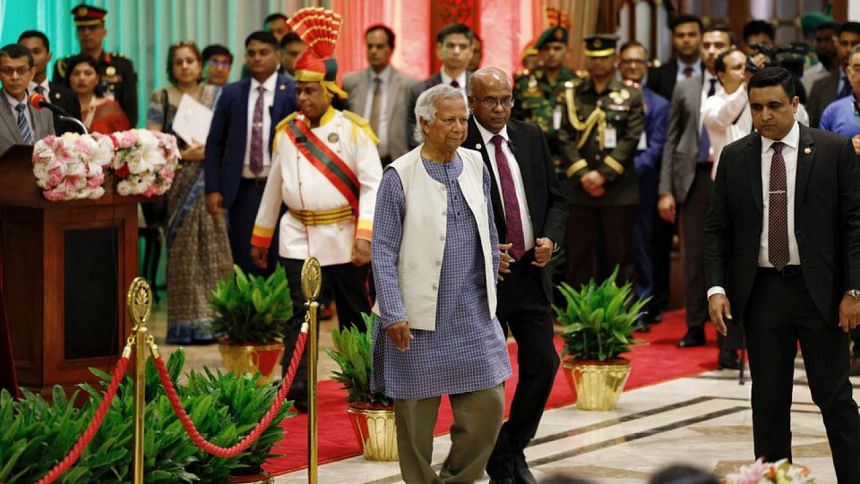
In its first 100 days, Bangladesh’s interim government (IG) has taken critical steps towards stabilising the country and signalling a new direction. The IG’s commitment to transparency and accountability stands out, with robust criticism now emerging freely in news outlets and on social media—a promising sign of democratic practices returning to public discourse. With substantial national and international support, the IG has initiated several changes, including public briefings and a clear anti-corruption stance, which are refreshing shifts from the secrecy of past regimes. Notable achievements include stabilising central bank reserves, appointing reform commissions, empowering the army to help restore law and order, supporting a peaceful celebration of the largest Hindu festival, and reopening of university campuses.
As I wrote in an earlier piece, there is a deep divide between the elite and the working people—a disconnect that’s not just economic or cultural, but deeply moral. Integrity has too often taken a backseat to personal gain, fracturing the country’s social and moral fabric. For decades, millions of Bangladeshis have felt that leaders of every stripe put self-interest above public good, leaving working people behind.
In addressing this disconnect, the IG faces deep-seated challenges on multiple fronts—from economic pressures to political factionalism—that demand a careful balance between “immediate actions” and a resilient “long-term vision.”
The government faces an uphill economic battle. High inflation, unemployment, and rising living costs weigh heavily on working people, while local corruption, soaring prices of food and fuel, and powerful syndicates controlling key sectors expose the deep-rooted challenges of dismantling entrenched power structures. The IG’s appeals to working people must be authentic and rooted in real change—not just high-minded reform ideas or blaming the past 15 years of institutional breakdown.
Political observers note a lack of political savvy within the IG, and its struggle to strike a balance between competing demands from various groups within and outside the government seems to be limiting its ability to deliver effective, actionable outcomes.
The IG must prioritise people’s most pressing needs, fears, and aspirations. For a rickshaw puller or garment worker, the focus isn’t on central bank reserves or constitutional reforms—they need assurance that they can afford food, protect their homes from syndicate control, and secure educational opportunities for their children’s future. The Open Market Sales programmes, offering essential food items at subsidised prices to low income families, is a proactive step towards maintaining affordability amid rising food inflation. However, such programmes need to expand to reach the millions still struggling.
While addressing these immediate needs, the IG must also build a resilient governance model that can withstand political shifts and uphold democratic principles. Avoiding past mistakes, such as the abrupt abolition of the caretaker government in 2011, will be key to restoring public trust. Strengthening institutions, establishing accountability pathways, and fostering diplomatic stability are essential for Bangladesh’s long-term growth.
People aren’t looking for quick fixes. They want a principled, realistic approach that respects the complexity of the task at hand. Building Bangladesh from Tetulia to Teknaf isn’t about instant solutions but about setting a foundation rooted in solid principles and pragmatic action.
After years of hollow promises, regime changes, and fragile constitutional amendments, many are questioning whether traditional governance models—democracy, socialism, or communism—still serve today’s needs. These frameworks were created for past eras marked by monarchies, colonialism, and industrial revolutions. Bangladesh in 2024 faces a new set of material and moral realities that demand a governance model built not only for the present but resilient enough to stand the test of time and political vagaries.
Bangladesh needs a new governance model rooted in both ideal justice (nyaya) and practical justice (niti). It must balance autonomy, inclusivity, and accountability, yet honour the country’s unique blend of culture, religion, and identity. Such a model is essential to unite people not as Bangalees or Bangladeshis but as a community of Boishamma Birodhee Jonogan committed to justice and opportunities for all.
The IG’s immediate priorities should include: i) bringing high-profile detainees to justice through a transparent judicial process; ii) reducing the influence of syndicates in essential sectors like food and housing; iii) increasing representation from a diverse set of stakeholders in the decision-making process; and iv) establishing a systematic, regular reporting process by the IG on progress and challenges to build public trust and transparency. Rather than waiting for another crisis to unfold, the IG should leverage its intelligence units to gather insights and proactively address growing discontent, some of which may be fuelled by competing factions.
Alongside these short-term actions, the IG must work on building a resilient governance model. A “Bangladesh 2.0” model should balance pragmatic action with justice and inclusivity, creating institutions that uphold democratic values and avoid past mistakes. Long-term goals should focus on strengthening institutions, establishing clear accountability pathways, and securing diplomatic stability to foster sustainable growth.
In international diplomacy, the IG faces the challenge of balancing ties with key allies while asserting Bangladesh’s sovereignty. With Trump’s re-election and close ties to Indian Prime Minister Modi, Bangladesh must navigate this complex landscape by emphasising its commitment to democratic values, stability, and regional cooperation. Strengthening partnerships with the US on counterterrorism and climate issues, while fostering respectful cooperation with India on economic and security concerns, will allow the IG to secure Bangladesh’s interests amid shifting alliances.
Moreover, the IG can leverage the unique asset of Professor Yunus and his extensive international network to reinforce Bangladesh’s diplomatic credibility. Balancing these international relationships with domestic priorities will require both skilful negotiation and a clear commitment to the interests of working people.
Bangladesh has defied odds before, but today’s greatest challenge is to bridge the widening divide between the elites and the working people. The IG must embrace principled pragmatism—a balance of foundational values and adaptable, practical approaches—to withstand political change and foster resilience. By addressing immediate needs and laying the groundwork for sustainable institutions, the IG can forge a future that honours its people and stands strong in the face of future challenges.
Daily Star









